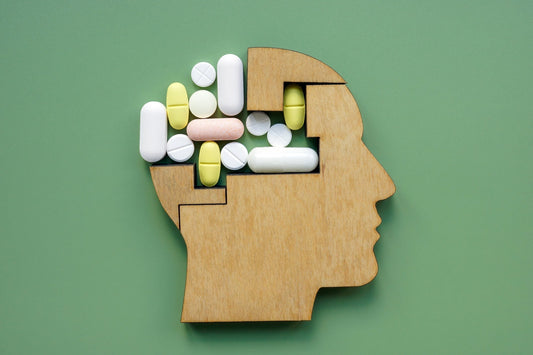As a clinician in mental health, your ability to deliver transformative care hinges on staying ahead of advances in science and practice. In recent years, brain health training has emerged as a game-changer for professionals seeking to optimize their patients' mental and cognitive well-being. By addressing the root causes of behavioral and emotional challenges, this training equips licensed mental health clinicians and other advanced practice professionals with powerful tools to improve outcomes and elevate their practice.

This article explores the top five benefits of brain health training for clinicians and the transformative potential it offers for your patients, practice, and professional growth.
Benefit #1: Improved Patient Outcomes Through Comprehensive Care
One of the most significant advantages of brain health training is its emphasis on treating patients holistically. Many traditional models focus solely on symptom management. Brain health training, however, dives deeper by exploring biological, psychological, social, and spiritual factors—Dr. Daniel Amen’s “Four Circles” model.
For instance, licensed mental health clinicians trained in brain health such as our Elite Brain Health Certifications, gain insights into the brain-body connection, enabling them to craft interventions that address not just the mind but also physical health. By integrating lifestyle changes, nutrition, and personalized cognitive behavioral therapy for clinicians, patients experience more sustainable improvements in their mental health. This approach sets a new standard for mental health professionals, ensuring patients achieve their fullest potential.
Benefit #2: Enhanced Ability to Identify Cognitive Decline Early
Early detection of cognitive decline such as Alzheimer's is a critical responsibility for behavioral health clinicians, especially as conditions like Alzheimer’s and dementia rise globally. Brain health training equips clinicians with the tools to identify early warning signs that may be overlooked in traditional mental health evaluations.
Through education and training for clinicians, professionals learn to use advanced technologies like SPECT imaging, which reveals blood flow and activity patterns in the brain. These insights allow for precise diagnoses and proactive intervention strategies, even before noticeable symptoms emerge.
The ability to detect cognitive decline early enables mental health clinicians to work collaboratively with patients and families to implement preventive measures, from lifestyle changes to targeted therapies. As a result, clinicians are not only addressing current symptoms but also mitigating future risks, reinforcing their role as trusted experts in their field.
Benefit #3: Addressing Mental Health Concerns with a Brain-Based Approach
Understanding the brain’s role in mental health transforms how clinicians approach conditions such as depression, anxiety, ADHD, and PTSD. Traditional methods often treat these conditions as isolated psychological issues, but brain health training reveals their biological underpinnings.
For example, types of mental health therapists trained in brain health learn to pinpoint specific brain regions associated with certain behaviors or challenges. Overactivity in the anterior cingulate gyrus, for instance, may manifest as obsessive-compulsive tendencies, while reduced prefrontal cortex activity may explain impulsivity or focus issues.
Armed with this knowledge, clinicians can create tailored treatment plans that combine brain-boosting therapies, lifestyle changes, and supplements. This brain-based approach often yields faster, more effective results, giving patients hope and clinicians a greater sense of efficacy in their work.
Benefit #4: Enhanced Patient Trust and Engagement
Building trust with patients is crucial for all behavioral health clinicians. When patients feel their clinician truly understands their challenges, they’re more likely to engage actively in their care. Brain health training provides clinicians with a unique ability to explain complex conditions in a way that resonates with patients.
Imagine explaining to a patient not just what their symptoms are, but why they’re occurring, using visual tools like brain imaging or simple analogies to describe brain function. This transparency fosters confidence in your expertise and encourages patients to commit to the personalized strategies you recommend.
In addition, mental health clinicians trained in brain health often adopt a coaching mindset, empowering patients to take an active role in their healing journey. This collaborative approach deepens the therapeutic relationship, creating a supportive environment where patients feel seen, understood, and hopeful.
Benefit #5: Professional Growth and Career Advancement
For clinicians wondering, “What is a mental health clinician’s next step in advancing their career?” Brain health training offers a compelling answer. As the demand for brain-based interventions grows, clinicians with specialized expertise stand out in a competitive field.
Brain health certification positions you as an advanced practice clinician, capable of offering cutting-edge services such as brain imaging analysis and personalized treatment planning. These skills not only attract a broader patient base but also open doors to leadership roles, speaking engagements, and opportunities to train other professionals.
Furthermore, staying ahead of trends like the integration of brain health into mental health care ensures that your practice remains relevant and highly valued. As patients and employers increasingly seek clinicians with advanced skills, this training serves as a powerful differentiator, paving the way for career growth and recognition.
The Future of Brain Health Training for Clinicians

The integration of brain health into mental health practice represents the future of care. As scientific understanding of the brain advances, clinicians who embrace this approach will lead the charge in transforming how mental health is understood and treated.
Education and training for clinicians will continue to evolve, incorporating tools like artificial intelligence for brain imaging, deeper dives into neurobiology, and more accessible ways to apply brain health principles in everyday practice. Clinicians who invest in this training now will not only shape their own success but also help redefine mental health care for generations to come.
Whether you’re a licensed mental health clinician, an advanced practice provider, or exploring what it means to be a clinician in mental health, brain health training is your opportunity to expand your impact. By enhancing patient outcomes, fostering trust, and positioning yourself at the forefront of your field, you’re not just advancing your career—you’re transforming lives.
Brain health training is more than just education; it’s a movement. Join the revolution, and unlock your potential to make a lasting difference in the lives of your patients and the future of mental health care.

 Amen University
Amen University








